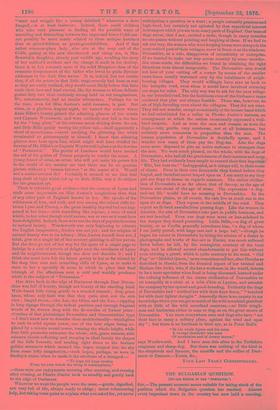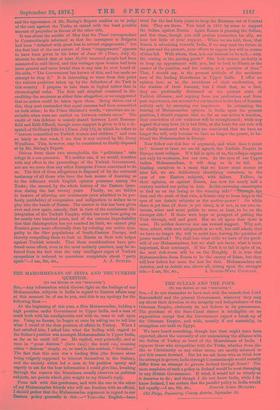THE BULGARIAN QUESTION - . rro.rna Roma Or ma smarms:"] Snt,—The present
moment seems suitable for taking stock of the position which the Bulgarian question has reached. Almost every important town in the country has now held a meeting,
and the appearance of Mr. Baring's Report enables us to judge of the case against the Turks, as stated with the least possible amount of prejudice in favour of the other side. It was about the middle of May that the Times' correspondent in Constantinople informed us that the insurgents in Bulgaria had been " defeated with great loss in several engagements ;" but the first hint of the real nature of these "engagements" appears to have been given in his letter of June 30 (Times, July 8), wherein he stated that at least 25,000 unarmed people had been massacred in cold blood, and that outrages upon women had been more general and more brutal than in any case he ever heard of. He adds, " The Government has known of this, and has made no attempt to stop it." It is interesting to trace from this point the various positions taken up by the defenders of the Turk in this country. I propose to take them in logical rather than in chronological order. The first and simplest consisted in dis- crediting the accounts as either false altogether, or so exaggerated that no action could be taken upon them. Being driven out of this, they next contended that equal excesses had been committed on both sides ; in the Prime Minister's words, "atrocities are in- evitable when wars are carried on between certain races." The credit of this defence is mainly shared between Lord Beacons- field and Edib Effendi, though some support is given to it in a de- spatch of SirHenry Elliot's (Times, July18), in which he refers to " horrors committed on Turkish women and children ;" and even so lately as last week, I see that it was revived by Mr. Percy Wyndham. This, however, may be considered as finally disposed of by Mr. Baring's Report.
Driven from these two strongholds, the " politicians " take refuge in a non-possumus. We neither can, if we would, interfere with any effect in the proceedings of the Turkish Government, nor are we more than any other European Power concerned to do so. The first of these allegations is disposed of by the universal testimony of all those who have the best means of knowing as to the influence which English opinion possesses among the Turks ; the second, by the whole history of the Eastern Ques- tion during the last twenty years. Finally, we are bidden to beware of allowing our sentiments (now admitted to be per- fectly justifiable) of compassion and indignation to induce us to play into the bands of Russia. The answer to this has been given over and over again, namely, that in view of the continuous dis- integration of the Turkish Empire, which has now been going on for nearly two hundred years, and of the extreme improbability that that disintegration has yet reached its limit, we cannot play Russia's game more effectually than by refusing our active sym- pathy to the Slav populations of South-Eastern Europe, and thereby compelling them to look to Russia as their sole helper against Turkish misrule. That these considerations have pro- duced some effect, even in the most unlikely quarters, may be in- ferred from the fact that the only intelligent organ of Turkish sympathies is reduced to querulous complaints about "party































 Previous page
Previous page